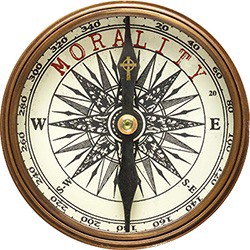The Relativity of Morality in the Contemporary World
by Anna Ornstein, MD
Abstract

Utilizing the author’s personal experience and applying psychoanalytic theory, this article explores the similarities and differences between the rise of Fascism in the 1930s and our current political climate, with special attention to the role of morality, both on an individual and collective basis. The article explores the way in which an individual’s morality is shaped by political and social circumstances. Likewise, this article describes the impact of a collapsing social moral order on the individual. Using Heinz Kohut’s self-psychological theory of development, personal morality is linked to internalized values and ideals rather than a Freudian model of the super-ego. The article examines how perpetrators can be motivated by their own ideals and morality while committing heinous crimes. Integrating Theodor Adorno’s ideas and self-psychology, the powerful role of the fascist leader appealing to the psychological needs of his followers is explored. Using the example of Kristallnacht, the article shows how the gradual loss of a moral order can lull citizens into accepting stepwise consequences until it is too late. From the point of view of those who are victims of fascist ideology, the article describes the challenges of holding on to ideals and values under a range of oppressive circumstances. The article highlights the value of a psychoanalytic understanding of our current political situation both for the individual and for society as a whole. A call for us to be mindful of the fragile but vital nature of our collective moral order.
Psychoanalytic Inquiry, 40:4, 223-233, 2020.
Link to Online Publication [fulltext can be requested from the library]
About the Author
Anna Ornstein, MD, is a Supervising Analyst at the Boston Psychoanalytic Society and Institute, Professor Emerita of Child Psychiatry at the University of Cincinnati, a Training and Supervising Analyst at the Cincinnati Psychoanalytic Institute, a Lecturer in Psychiatry at Harvard University. She was born in Hungary in 1927. She survived deportation, ghetto imprisonment, the Auschwitz concentration camp, and the Parschnitz labor camp. In 2018, Dr. Ornstein received the Kravitz Award in recognition of her dedication to teaching about the Holocaust and the dangers of intolerance: follow this link to watch Anna Ornstein’s Kravitz Award Interview recorded in 2019. On Nov 9, 2020, she received the Terezin Legacy Award for her lifelong dedication to Holocaust remembrance and education – click here to watch the 2020 Terezin Music Foundation Gala and Award Ceremony.
Previous Posts:
Sarah Ackerman, PhD (2020). Impossible Ethics. Journal of the American Psychoanalytic Association. 2020;68(4):561-582.
Cordelia Schmidt-Hellerau, PhD (2020). How Demagogy Works: Reflections on Aggression in Politically Fraught Times. Psychoanalytic Inquiry, 40:4, 234-242
Judy Yanof, MD (2020). A Separation: Breaking Up Is Hard to Do. The Psychoanalytic Study of the Child, 73:1, 172-181.
Elsa Ronningstam et al. (2020). Psychotherapeutic Treatment of Depressive Symptoms in Patients with Narcissistic Disturbances: A Review. Journal of Contemporary Psychotherapy, 50, 21–28.
John C. Foehl (2020). Lived Depth: A Phenomenology of Psychoanalytic Process and Identity. Psychoanalytic Inquiry, 40(2), 131-146.
Cordelia Schmidt-Hellerau, PhD (2019).Body and Mind: Two Sides of One Coin. The Scandinavian Psychoanalytic Review, 42(1-2), 93-102.
Robin Gomolin, PsyaD (2019). The Intergenerational Transmission of Holocaust trauma: A psychoanalytic theory revisited. Psychoanalytic Quarterly, 88(3), 461–500.
Anna Ornstein, MD (2020). Mourning. In The Handbook of Psychoanalytic Holocaust Studies: International Perspectives, edited Ira Brenner. Routledge, 2019, p. 74-80.
Randall H. Paulsen, MD (2019). Scientific Theory on the Couch: A Response to Scott C. Taylor. American Imago, 76(3), 405-411.
Bernard Edelstein, MD (2019). Introduction: Stumbling on our Past, Reflections on James Baldwin’s “My Dungeon Shook”. American Imago, 76(3): 295-300.
Don Lipsitt, MD (2020). Is Today’s 21st Century Burnout 19th Century’s Neurasthenia? The Journal of Nervous and Mental Disease, 207(9): 773-777, September 2019.
Elsa Ronningstam, PhD (2020). Internal Processing in Patients with Pathological Narcissism or Narcissistic Personality Disorder: Implications for Alliance Building and Therapeutic Strategies. Journal of Personality Disorders, 34 (Suppl): 80-103.
Dan Jacobs (2019). Three’s a Crowd: Stella’s Pregnancy and the Arrival of an “Other” in A Streetcar Named Desire. International Journal of Applied Psychoanalytic Studies. 16:3, 174– 180.
Click here to see a full archive of featured papers. All articles can be requested from the library.

